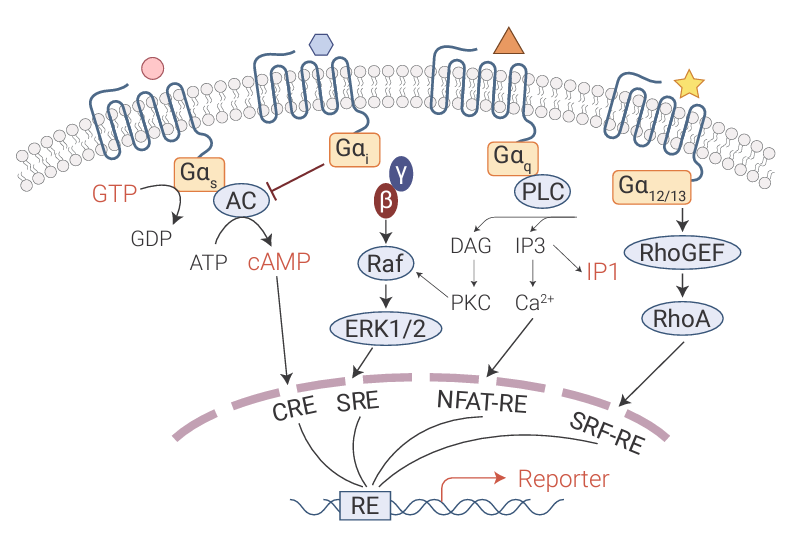G protein-coupled receptors (GPCRs) are key therapeutic targets in drug discovery due to their central role in various physiological processes. Their involvement in signaling pathways that regulate cellular responses to hormones and neurotransmitters makes them an attractive focus for disease intervention. For researchers, finding a reliable GPCR assay kit supplier is essential to study these pathways effectively and drive advancements in drug development.This blog explores the applications of GPCR signaling assays in high-throughput screening (HTS), their impact on GPCR drug discovery, and why modern assay kits are indispensable for multi-target platforms.
Table of contents:
Common Signaling Pathways Targeted in GPCR Drug Discovery
How GPCR Assays Serve as Essential Tools in Screening Libraries
Future-Ready GPCR Assay Kits Built for Multi-Target Platforms
GPCR signaling pathways play a central role in a variety of cell mechanisms, making them pivotal in understanding and tackling disease pathologies. GPCRs function through their activation by ligands, which trigger conformational changes in the receptor and interact with G proteins, β-arrestins, or alternative signaling cascades. The cAMP, inositol monophosphate (IP1), and calcium signaling pathways are widely studied since they provide rich data on Gs, Gi, and Gq protein families. Another important mechanism is β-arrestin recruitment, which highlights receptor desensitization and internalization dynamics. Drug discovery efforts often focus on these pathways to address a wide range of health issues, including chronic conditions, psychiatric disorders, cancer, and cardiovascular diseases. G protein-coupled receptors (GPCRs) play a central role in these efforts, as they are involved in numerous physiological processes and are highly druggable targets. GPCR-targeted therapies utilize specific modulatory actions, such as agonists, antagonists, or positive allosteric modulators, to influence these signaling cascades. By precisely targeting these receptors, researchers aim to develop treatments that are both effective and selective, minimizing side effects while maximizing therapeutic benefits. This makes GPCRs a critical focus in the development of innovative medicines.

GPCR assays serve as the backbone of high-throughput screening for identifying potential drug candidates from extensive compound libraries. These assays ensure the systematic evaluation of new compounds' efficacy, selectivity, and safety profiles. Functional assays, such as cAMP measurements, calcium flux, β-arrestin recruitment, and GTPγS binding, are indispensable for capturing the nuances of GPCR activation and downstream responses. Binding assays also play a vital role, providing insights into ligand-receptor interaction properties. Radioligand binding, tag-lite assays, and advanced techniques like the Biacore 8K SPR platform deliver comprehensive affinity data. The precision and adaptability of these technologies allow researchers to pinpoint potential hits or leads that warrant further optimization, providing a more focused and efficient approach to drug discovery. By enabling detailed analysis of compound interactions and their specific effects, GPCR assays contribute to a deeper understanding of drug mechanisms. These assays empower researchers to drastically reduce attrition rates in the drug development pipeline by identifying risky or ineffective compounds early in the process, saving valuable time and resources while increasing the chances of success for promising candidates.
GPCR assay kits are evolving to meet the complexity of drug discovery in the modern era. Today’s kits are designed for use across multiple targets, making them compatible with high-throughput platforms. The convenience of ready-to-use GPCR assay kits, featuring more than 170 targets across species, saves both time and effort during experimental setups. These kits often include advanced tools for detecting subtle signaling changes, such as pERK/pAKT in-cell Western assays and real-time receptor internalization measurements. CROs like ICE Bioscience specialize in producing kits that accelerate the screening process while maintaining top-tier precision. Additionally, modern GPCR assay kits reduce logistical challenges, enabling seamless integration into robotic HTS platforms or automated laboratory workflows, drastically enhancing productivity.
The advancements in GPCR assay technologies have revolutionized drug discovery, providing researchers with powerful tools to streamline and enhance their workflows. From accelerating high-throughput screening to enabling detailed mechanistic insights, these innovations ensure greater precision and efficiency. By leveraging cutting-edge assays and specialized kits, scientists can overcome traditional challenges in GPCR research, paving the way for more effective therapeutic discoveries.
2026-02-04
2026-02-04
2026-02-04
2026-02-04
We value your inquiries and are here to provide you with tailored solutions for your drug discovery and development needs. Whether you have questions, require more information, or are interested in discussing potential collaborations, our team of experts is just a message away.
Feel free to reach out to us.